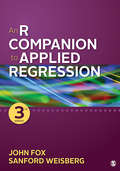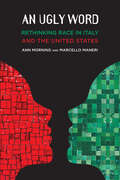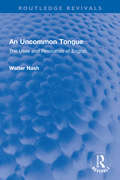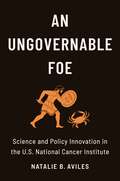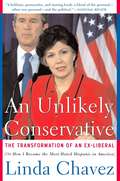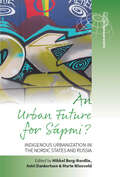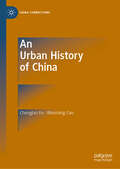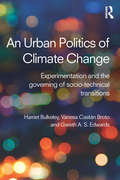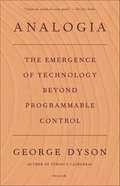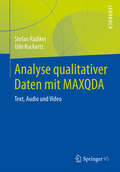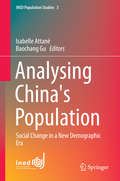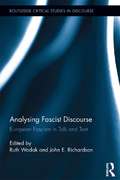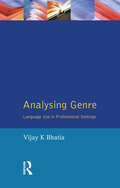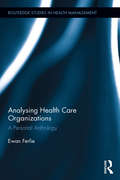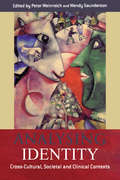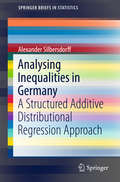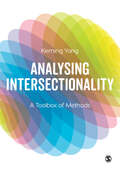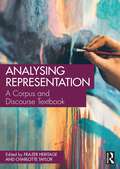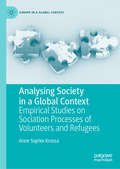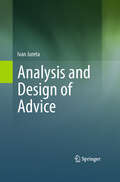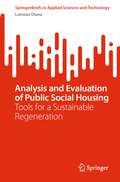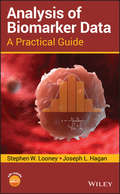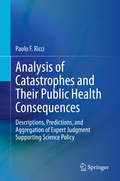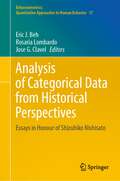- Table View
- List View
An R Companion to Applied Regression
by John Fox Sanford WeisbergAn R Companion to Applied Regression is a broad introduction to the R statistical computing environment in the context of applied regression analysis. John Fox and Sanford Weisberg provide a step-by-step guide to using the free statistical software R, an emphasis on integrating statistical computing in R with the practice of data analysis, coverage of generalized linear models, and substantial web-based support materials. The Third Edition has been reorganized and includes a new chapter on mixed-effects models, new and updated data sets, and a de-emphasis on statistical programming, while retaining a general introduction to basic R programming. The authors have substantially updated both the car and effects packages for R for this edition, introducing additional capabilities and making the software more consistent and easier to use. They also advocate an everyday data-analysis workflow that encourages reproducible research. To this end, they provide coverage of RStudio, an interactive development environment for R that allows readers to organize and document their work in a simple and intuitive fashion, and then easily share their results with others. Also included is coverage of R Markdown, showing how to create documents that mix R commands with explanatory text. "An R Companion to Applied Regression continues to provide the most comprehensive and user-friendly guide to estimating, interpreting, and presenting results from regression models in R." –Christopher Hare, University of California, Davis
An Ugly Word: Rethinking Race in Italy and the United States
by Ann Morning Marcello ManeriScholars and politicians often assume a significant gap between the ways that Americans and Europeans think about race. According to this template, in the U.S. race is associated with physical characteristics, while in Western Europe race has disappeared, and discrimination is based on insurmountable cultural differences. However, little research has addressed how average Americans and Europeans actually think and talk about race. In An Ugly Word, sociologists Ann Morning and Marcello Maneri examine American and Italian understandings of group difference in order to determine if and how they may differ. Morning and Maneri interviewed over 150 people across the two countries about differences among what they refer to as “descent-based groups.” Using this concept allowed them to sidestep the language of “race” and “ethnicity,” which can be unnecessarily narrow, poorly defined, or even offensive to some. Drawing on these interviews, the authors find that while ways of speaking about group difference vary considerably across the Atlantic, underlying beliefs about it do not. The similarity in American and Italian understandings of difference was particularly evident when discussing sports. Both groups relied heavily on traditional stereotypes of Black physicality to explain Black athletes’ overrepresentation in sports like U.S. football and their underrepresentation in sports like swimming – contradicting the claims that a biological notion of race is a distinctly American phenomenon. While American and Italian concepts of difference may overlap extensively, they are not identical. Interviews in Italy were more likely to reveal beliefs about groups’ innate, unchangeable temperaments, such as friendly Senegalese and dishonest Roma. And where physical difference was seen by Italians as superficial and unimportant, cultural difference was perceived as deeply meaningful and consequential. In contrast, U.S. interviewees saw cultural difference as supremely malleable—and often ascribed the same fluidity to racial identity, which they believed stemmed from culture as well as biology. In light of their findings, Morning and Maneri propose a new approach to understanding cross-cultural beliefs about descent-based difference that includes identifying the traits people believe differentiate groups, how they believe those traits are acquired, and whether they believe these traits can change. An Ugly Word is an illuminating, cross-national examination of the ways in which people around the world make sense of race and difference.
An Uncommon Tongue: The Uses and Resources of English (Routledge Revivals)
by Walter NashFirst published in 1991, An Uncommon Tongue explores the theme of usage in its widest sense: usage as what we say or write; usage as a social question; usage as a literary convention; usage and creativity. The book reflects on the practice and status of the English language in the modern world and the demands it makes on its academic disciplines. It puts forward the argument that the study of usage transcends both the ‘prescriptive’ and ‘descriptive’ and is ultimately ‘constructive’, displaying the resources of language and exploring their use.
An Ungovernable Foe: Science and Policy Innovation in the U.S. National Cancer Institute
by Natalie B. AvilesIn American politics, medical innovation is often considered the domain of the private sector. Yet some of the most significant scientific and health breakthroughs of the past century have emerged from government research institutes. The U.S. National Cancer Institute (NCI) is tasked with both understanding and eradicating cancer—and its researchers have developed a surprising expertise in virus research and vaccine development.An Ungovernable Foe examines seventy years of federally funded scientific breakthroughs in the laboratories of the NCI to shed new light on how bureaucratic organizations nurture innovation. Natalie B. Aviles analyzes research and policy efforts around the search for a viral cause of leukemia in the 1960s, the discovery of HIV and the development of AIDS drugs in the 1980s, and the invention of the HPV vaccine in the 1990s. She argues that the NCI transformed generations of researchers into innovative public servants who have learned to balance their scientific and bureaucratic missions. These “scientist-bureaucrats” are simultaneously committed to conducting cutting-edge research and stewarding the nation’s investment in cancer research, and as a result they have developed an unparalleled expertise. Aviles demonstrates how the interplay of science, politics, and administration shaped the NCI into a mission-oriented agency that enabled significant breakthroughs in cancer research—and in the process, she shows how organizational cultures indelibly stamp scientific work.
An Unlikely Conservative: The Transformation of an Ex-Liberal
by Linda ChavezWhen President George W. Bush nominated Linda Chavez to be Secretary of Labor in 2001, few people realized that this hard-nosed conservative began her career among socialists and labor union officials, teaching in college affirmative action programs and writing political propaganda for the Democratic National Committee. An Unlikely Conservative chronicles Chavez's journey from a poverty-stricken childhood to prominence as one of the most influential public policy advocates in the nation, and the sometimes shocking experiences that shaped her views along the way.
An Urban Future for Sápmi?: Indigenous Urbanization in the Nordic States and Russia (Studies in the Circumpolar North #4)
by Marte Winsvold Mikkel Berg-Nordlie, Astri DankertsenPresenting the political and cultural processes that occur within the indigenous Sámi people of North Europe as they undergo urbanization, this book examines how they have retained their sense of history and culture in this new setting. The book presents data and analysis on subjects such as indigenous urbanization history, urban indigenous identity issues, urban indigenous youth, and the governance of urban “spaces” for indigenous culture and community. The book is written by a team of researchers, mostly Sámi, from all the countries covered in the book.
An Urban History of China (China Connections)
by Chonglan Fu Wenming CaoThis book considers urban development in China, highlighting links between China’s history and civilization and the rapid evolution of its urban forms. It explores the early days of urban dwelling in China, progressing to an analysis of residential environments in the industrial age. It also examines China’s modern and postmodern architecture, considered as derivative or lacking spiritual meaning or personality, and showcases how China's traditional culture underpins the emergence of China’s modern cities. Focusing on the notion of “courtyard spirit” in China, it offers a study of the urban public squares central to Chinese society, and examines the disruption of the traditional Square model and the rise and growth of new architectural models.
An Urban Politics of Climate Change: Experimentation and the Governing of Socio-Technical Transitions
by Vanesa Castán Broto Harriet A Bulkeley Gareth A.S. EdwardsThe confluence of global climate change, growing levels of energy consumption and rapid urbanization has led the international policy community to regard urban responses to climate change as ‘an urgent agenda’ (World Bank 2010). The contribution of cities to rising levels of greenhouse gas emissions coupled with concerns about the vulnerability of urban places and communities to the impacts of climate change have led to a relatively recent and rapidly proliferating interest amongst both academic and policy communities in how cities might be able to respond to mitigation and adaptation. Attention has focused on the potential for municipal authorities to develop policy and plans that can address these twin issues, and the challenges of capacity, resource and politics that have been encountered. While this literature has captured some of the essential means through which the urban response to climate change is being forged, is that it has failed to take account of the multiple sites and spaces of climate change response that are emerging in cities ‘off-plan’. An Urban Politics of Climate Change provides the first account of urban responses to climate change that moves beyond the boundary of municipal institutions to critically examine the governing of climate change in the city as a matter of both public and private authority, and to engage with the ways in which this is bound up with the politics and practices of urban infrastructure. The book draws on cases from multiple cities in both developed and emerging economies to providing new insight into the potential and limitations of urban responses to climate change, as well as new conceptual direction for our understanding of the politics of environmental governance.
Analogia: The Emergence of Technology Beyond Programmable Control
by George DysonNamed one of WIRED’s "The Best Pop Culture That Got Us Through 2020"In Analogia, technology historian George Dyson presents a startling look back at the analog age and life before the digital revolution—and an unsettling vision of what comes next.In 1716, the philosopher and mathematician Gottfried Wilhelm Leibniz spent eight days taking the cure with Peter the Great at Bad Pyrmont in Saxony, trying to persuade the tsar to launch a voyage of discovery from Russia to America and to adopt digital computing as the foundation for a remaking of life on earth. In two classic books, Darwin Among the Machines and Turing’s Cathedral, George Dyson chronicled the realization of the second of Leibniz’s visions. In Analogia, his pathbreaking new book, he brings the story full circle, starting with the Russian American expedition of 1741 and ending with the beyond-digital revolution that will completethe transformation of the world.Dyson enlists a startling cast of characters, from the time of Catherine the Great to the age of machine intelligence, and draws heavily on his own experiences at the Institute for Advanced Study in Princeton, New Jersey, and onward to the rain forest of the Northwest Coast. We are, Dyson reveals, entering a new epoch in human history, one driven by a generation of machines whose powers are no longer under programmable control. Includes black-and-white illustrations
Analyse qualitativer Daten mit MAXQDA: Text, Audio und Video
by Udo Kuckartz Stefan RädikerDieses Buch vermittelt auf verständliche Weise das Wissen, um qualitative und Mixed-Methods-Daten mit MAXQDA auszuwerten. Die Autoren verfügen über jahrzehntelange Forschungserfahrung und decken in diesem Buch ein breites Methodenspektrum ab. Sie beschränken sich nicht auf einzelne Forschungsansätze, sondern vermitteln das Know-how, um verschiedene Methoden – von der Grounded Theory über Diskursanalysen bis zur Qualitativen Inhaltsanalyse – mit MAXQDA umsetzen zu können. Darüber hinaus werden spezielle Themen fokussiert, wie Transkription, Kategorienbildung, Visualisierungen, Videoanalyse, Concept-Maps, Gruppenvergleiche und die Erstellung von Literaturreviews.
Analysing China's Population: Social Change in a New Demographic Era (INED Population Studies #3)
by Isabelle Attané Baochang GuBased on China's recently released 2010 population census data, this edited volume analyses the most recent demographic trends in China, in the context of significant social and economic upheavals. The editor and the expert contributors describe the main features of China's demography, and focus on the details of this latest phase of its demographic transition. The book explores such striking characteristics of China's demography as the changing age and sex population structure; recent trends in marriage and divorce; fertility trends with a focus on sex imbalance at birth; the demography of the ethnic minorities and recent mortality trends by sex. Analysing China's Population: Social Change in a New Demographic Era examines and assesses the impact of changes that in the coming decades will be crucial for individuals, and the larger society and economy of the nation.
Analysing Fascist Discourse: European Fascism in Talk and Text (Routledge Critical Studies in Discourse #5)
by Ruth Wodak John E. RichardsonThis book focuses primarily on continuities and discontinuities of fascist politics as manifested in discourses of post-war European countries. Many traumatic pasts in Europe are linked to the experience of fascist and national-socialist regimes in the 20th century and to related colonial and imperialist expansionist politics. And yet we are again confronted with the emergence, rise and success of extreme right wing political movements, across Europe and beyond, which frequently draw on fascist and national-socialist ideologies, themes, idioms, arguments and lexical items. Post-war taboos have forced such parties, politicians and their electorate to frequently code their exclusionary fascist rhetoric. This collection shows that an interdisciplinary critical approach to fascist text and talk—subsuming all instances of meaning-making (oral, visual, written, sounds, etc.) and genres such as policy documents, speeches, school books, media reporting, posters, songs, logos and other symbols—is necessary to deconstruct exclusionary meanings and to confront their inegalitarian political projects.
Analysing Genre: Language Use in Professional Settings (Applied Linguistics and Language Study)
by V. K. BhatiaGenre analysis has a long-established tradition in literature, but interest in the analysis of non-literary genres has been very recent. This book examines the theory of genre analysis, looks at genre analysis in action, taking texts from a wide variety of genres and discusses the use of genre analysis in language teaching and language reform.
Analysing Health Care Organizations: A Personal Anthology (Routledge Studies in Health Management)
by Ewan FerlieAnalysing Health Care Organizations seeks to link the world of health policy and management with the academic field of organization studies in a novel and additive way. It outlines the main developments in UK health care management apparent over the last thirty years and explores how they might be (re)seen with the application of some important organizational theories and perspectives. This book draws out contemporary and enduring themes from current literature on health care organization and considers them from a range of theoretical perspectives. Drawing on robust areas of research and some key academics who contribute to work in this field, it is a book relevant both to experts in the field and to those seeking to develop an understanding of health care organization from a theoretical perspective. Analysing Health Care Organizations provides a state of the art introduction foundation for subsequent works that will extend its content; providing a broad introductory overview of this theoretical terrain and setting the scene for further research.
Analysing Identity: Cross-Cultural, Societal and Clinical Contexts
by Peter Weinreich Wendy SaundersonPeople's identities are addressed and brought into being by interaction with others. Identity processes encompass biographical experiences, historical eras and cultural norms in which the self's autonomy varies according to the flux of power relationships with others. Identity Structure Analysis (ISA) draws upon psychological, sociological and social anthropological theory and evidence to formulate a system of concepts that help explain the notion of identity. They can be applied to the practical investigations of identity structure and identity development in a number of clinical, societal and cultural settings. This book includes topics on national and ethnic identification in multicultural contexts and gender identity relating to social context and the urban environment. Clinical applications that describe identity processes associated with psychological distress are also examined. These include anorexia nervosa and vicarious traumatisation of counsellors in the aftermath of atrocity. Analysing Identity is unique in its development of this integrative conceptualisation of self and identity, and its operationalisation in practice. This innovative book will appeal to academics and professionals in developmental, social, cross-cultural, clinical and educational psychology and psychotherapy. It will also be of interest to those involved with sociology, political science, gender studies, ethnic studies and social policy. Of particular note is the availability of new software, Ipseus, which facilitates ISA for use by practitioners. It enables them to enhance their professional skills by ascertaining their clients’ perspectives on self as located in the social world. This has been successfully used with pre-school three to five year-old children, and all other age-ranges through childhood, adolescence and adulthood. Ipseus is designed to be used in inter-cultural contexts and appeals to practitioners for their input for the generation of customized identity instruments (see www.identityexploration.com).
Analysing Inequalities in Germany: A Structured Additive Distributional Regression Approach (SpringerBriefs in Statistics)
by Alexander SilbersdorffThis book seeks new perspectives on the growing inequalities that our societies face, putting forward Structured Additive Distributional Regression as a means of statistical analysis that circumvents the common problem of analytical reduction to simple point estimators. This new approach allows the observed discrepancy between the individuals' realities and the abstract representation of those realities to be explicitly taken into consideration using the arithmetic mean alone. In turn, the method is applied to the question of economic inequality in Germany.
Analysing Intersectionality: A Toolbox of Methods
by Keming YangHow can we analyse the intersectional effects of multiple factors on experiences of disenfranchisement? This book equips you with the methodological tools to uncover new insights. First providing a critical examination of long-standing methodologies in intersectionality research, it then shines a spotlight on analytical techniques such as qualitative comparative analysis, multilevel models, mediation and moderation, and mixed methods designs. With chapter objectives, real-world research examples, further reading and reflective questions, it will equip you with the methodological tools to understand intersectionality in specific social settings. The book: · Bridges the gap between intersectionality as a theory and an empirical research practice. · Extends existing approaches to analysing intersectionality in a traditionally qualitative field. · Inspires creativity and celebrates a variety of effective methods for studying intersectionality. Innovative and thought-provoking, this book is ideal for any student or researcher looking to harness the power of empirical evidence to explore inequality and injustice.
Analysing Intersectionality: A Toolbox of Methods
by Keming YangHow can we analyse the intersectional effects of multiple factors on experiences of disenfranchisement? This book equips you with the methodological tools to uncover new insights. First providing a critical examination of long-standing methodologies in intersectionality research, it then shines a spotlight on analytical techniques such as qualitative comparative analysis, multilevel models, mediation and moderation, and mixed methods designs. With chapter objectives, real-world research examples, further reading and reflective questions, it will equip you with the methodological tools to understand intersectionality in specific social settings. The book: · Bridges the gap between intersectionality as a theory and an empirical research practice. · Extends existing approaches to analysing intersectionality in a traditionally qualitative field. · Inspires creativity and celebrates a variety of effective methods for studying intersectionality. Innovative and thought-provoking, this book is ideal for any student or researcher looking to harness the power of empirical evidence to explore inequality and injustice.
Analysing Representation: A Corpus and Discourse Textbook
by Frazer HeritageAnalysing Representation: A Corpus and Discourse Textbook guides readers through the process of researching how people and phenomena are represented in discourse and introduces them to key tools they can use from corpus linguistics and (critical) discourse analysis. This book takes a step-by-step approach to introducing each concept and includes exercises and further reading to help readers check their progress and prepare for independent research. It is unique in introducing readers to a range of experts representing the full range of work in this area. This book is aimed at final-year undergraduate, taught postgraduate and doctoral level students. It wil also be useful to scholars who are new to combining corpus and discourse methods in investigations of representation.
Analysing Society in a Global Context: Empirical Studies on Sociation Processes of Volunteers and Refugees (Europe in a Global Context)
by Anne Sophie KrossaThis book is the empirical part of a broad research project on society in a global context, complementing the first, theoretical book, Theorizing Society in a Global Context. While the theoretical book set the framework for a long overdue readdressing of the sociological core-term society in a conflict-theoretical perspective, this second book substantiates its findings with theory-driven empirical analysis. Krossa investigates a variety of social exchanges between refugees and longer-term residents using various qualitative methods, and applies a lens of inclusion and exclusion via definitions of dirt and cleanliness, to analyse the ways in which conflict-prone activities to ‘integrate’ take place. Analysing Society in a Global Context will be of interest to students and scholars across sociology, cultural studies, migration studies, European studies, globalisation studies, modern history, and political science.
Analysis and Design of Advice
by Ivan JuretaThis innovative book offers a rigorous approach to the analysis and design of advice in real-world decision situations, in which the advisor must manage with variously imprecise, unclear, incomplete or conflicting qualitative information.
Analysis and Evaluation of Public Social Housing: Tools for a Sustainable Regeneration (SpringerBriefs in Applied Sciences and Technology)
by Lorenzo DianaThe book explores current characteristics of the urban built environment in view of possible future transformations. A cross-reading analysis of existing public social housing buildings is proposed, based on the investigation of their architectural, structural, and energetic characteristics. The study aims to provide an integrated approach that captures the link between typology, construction, and energy demands, offering a key to understanding the main critical issues and transformation readiness. It focuses on large-scale interventions composing public social housing stocks, realized during the second half of the twentieth century. More than other public interventions, such building stocks clearly lack in meeting current housing needs such as modern apartment architectural layout, energy and structural regulations, and social mix. However, due to their numerical presence, strategical and widespread distribution across urban areas, and transformability, these buildings can be the target for future strategic regeneration projects. In particular, the book thoroughly investigates the social housing estate constructed in Rome (Italy) after the approval in 1964 of the first urban economic and social housing plan.
Analysis of Biomarker Data
by Stephen W. Looney Joseph L. HaganA "how to" guide for applying statistical methods to biomarker data analysisPresenting a solid foundation for the statistical methods that are used to analyze biomarker data, Analysis of Biomarker Data: A Practical Guide features preferred techniques for biomarker validation. The authors provide descriptions of select elementary statistical methods that are traditionally used to analyze biomarker data with a focus on the proper application of each method, including necessary assumptions, software recommendations, and proper interpretation of computer output. In addition, the book discusses frequently encountered challenges in analyzing biomarker data and how to deal with them, methods for the quality assessment of biomarkers, and biomarker study designs. Covering a broad range of statistical methods that have been used to analyze biomarker data in published research studies, Analysis of Biomarker Data: A Practical Guide also features:A greater emphasis on the application of methods as opposed to the underlying statistical and mathematical theoryThe use of SAS®, R , and other software throughout to illustrate the presented calculations for each exampleNumerous exercises based on real-world data as well as solutions to the problems to aid in reader comprehensionThe principles of good research study design and the methods for assessing the quality of a newly proposed biomarkerA companion website that includes a software appendix with multiple types of software and complete data sets from the book's examplesAnalysis of Biomarker Data: A Practical Guide is an ideal upper-undergraduate and graduate-level textbook for courses in the biological or environmental sciences. An excellent reference for statisticians who routinely analyze and interpret biomarker data, the book is also useful for researchers who wish to perform their own analyses of biomarker data, such as toxicologists, pharmacologists, epidemiologists, environmental and clinical laboratory scientists, and other professionals in the health and environmental sciences.
Analysis of Catastrophes and Their Public Health Consequences: Descriptions, Predictions, and Aggregation of Expert Judgment Supporting Science Policy
by Paolo F. RicciPublic health policy prospectively and retrospectively addresses the consequences of events ranging from the commonplace to the catastrophic. Informing policymakers and stakeholders by enhancing their understanding of complex causation to justify remedial or precautionary actions is a critical science-policy task. In this book, the key aspects of catastrophes (regardless of their nature) and routine events are identified through a common framework for their analyses, and the analyses of the consequences associated with the potential occurrence of these events also are discussed. The book is not about disaster planning; instead, it is focused on analysis and causation in the context of informing – rather than formulating – public health policy. The author aggregates and fuses scientific information and knowledge in public health policy-science using alternative but complementary methods. The book first focuses on the analysis of catastrophes and commonplace events; the focus then shifts to causal models of multifactorial diseases, particularly at low doses or dose-rates, associated with these events. Topics explored among the chapters include:Policy and Legal Aspects of Precautionary ChoicesCatastrophes, Disasters, and Calamities: Concepts for Their Assessment Uncertainty: Probabilistic and Statistical AspectsAggregating Judgments to Inform Precautionary Decision-makingThe aim of the book is to show that the analyses of events are fundamentally similar, regardless of whether the concern is a global catastrophe or commonplace. Analysis of Catastrophes and Their Public Health Consequences is a text that should engage students, instructors, and researchers in public health, science policy, and preparedness research, as well as serve as a useful resource for policy analysts, practitioners, and risk managers.
Analysis of Categorical Data from Historical Perspectives: Essays in Honour of Shizuhiko Nishisato (Behaviormetrics: Quantitative Approaches to Human Behavior #17)
by Eric J. Beh Rosaria Lombardo Jose G. ClavelThis collection of essays is in honor of Shizuhiko Nishisato on his 88th birthday and consists of invited contributions only. The book contains essays on the analysis of categorical data, which includes quantification theory, cluster analysis, and other areas of multidimensional data analysis, covering more than half a century of research by the 41 interdisciplinary and international researchers who are contributors. Thus, it offers the wisdom and experience of work past and present and attracts a new generation of researchers to this field. Central to this wisdom and experience is that of Prof. Nishisato, who has spent much of the past 60 years mentoring and providing leadership in the research of quantification theory, especially that of “dual scaling”. The book includes contributions by leading researchers who have worked alongside Prof. Nishisato, published with him, been mentored by him, or whose work has been influenced by the research he has undertaken over his illustrious career. This book inspires researchers young and old as it highlights the significant contributions, past and present, that Prof. Nishisato has made in his field.
